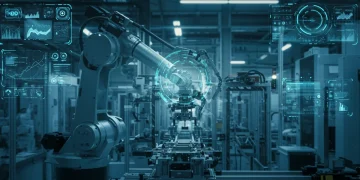AI in supply chain management: how to enhance efficiency

AI in supply chain management enhances efficiency through automation, predictive analytics, and integration with technologies like blockchain, driving better decision-making and sustainable practices.
AI in supply chain management is reshaping how businesses handle logistics and inventory. If you’ve ever wondered how advanced technology can streamline processes and save costs, this article is for you.
Understanding AI in supply chain management
Understanding AI in supply chain management is essential for businesses looking to enhance their operations. This technology uses data and algorithms to improve efficiency in logistics and distribution.
What is AI in supply chain management?
AI refers to the simulation of human intelligence in machines, enabling them to perform tasks such as data analysis, decision making, and predicting outcomes. In supply chain management, AI can analyze vast amounts of data, optimizing routes, inventory levels, and demand forecasts.
Benefits of AI
- Improved efficiency through automation of routine tasks.
- Enhanced decision-making with predictive analytics.
- Better customer satisfaction through timely deliveries.
- Cost reductions by optimizing resource allocation.
Integrating AI into supply chains leads to significant improvements in performance. For instance, AI algorithms can predict demand fluctuations, allowing businesses to adjust their inventory accordingly. This reduces the risk of overstocking or stockouts, saving money and resources.
Moreover, AI technologies foster better communication across the supply chain. With real-time data analysis, companies can collaborate more effectively, ensuring that everyone is on the same page, from manufacturers to retailers. Text and data can flow seamlessly, making operations smoother.
Real-world examples
Many companies are already leveraging AI in supply chain management. For example, Amazon utilizes AI to optimize its delivery routes, significantly reducing delivery times and costs. Similarly, Walmart employs predictive analytics to manage inventory efficiently across its numerous locations.
As more businesses adopt these technologies, the landscape of supply chain management will continue to evolve, leading to smarter, more efficient operations.
Key benefits of AI in logistics
The key benefits of AI in logistics are transforming how businesses operate. By leveraging artificial intelligence, companies can streamline their processes and gain a competitive edge.
Increased Efficiency
One of the most significant advantages of AI is the boost in efficiency it offers. Automated systems can handle tasks like scheduling and inventory management faster than humans. This means fewer delays and more timely deliveries for customers.
Cost Savings
- Reducing labor costs through automation.
- Minimizing waste with precise inventory management.
- Lowering transportation costs with optimized routes.
- Improving resource allocation to avoid overproduction.
These improvements lead to substantial cost savings over time. For instance, AI algorithms can analyze historical data to predict demand, helping businesses stock the right amount of products without overspending.
Furthermore, AI in logistics enhances supply chain visibility. With real-time tracking, businesses can monitor shipments and address potential issues before they escalate. This proactive approach not only keeps customers informed but also improves overall satisfaction.
Better Decision-Making
Utilizing machine learning allows companies to make data-driven decisions. AI systems can evaluate complex data sets to identify trends and anomalies. This capability enables managers to respond quickly to changes in the market or supply chain.
When businesses embrace AI, they can focus on strategic initiatives. Rather than spending hours on manual tasks, employees can dedicate their time to innovation and customer relations. This shift leads to a more engaged workforce and better long-term results.
Real-world applications of AI technologies

Real-world applications of AI technologies are transforming industries, particularly in logistics and supply chain management. Companies are finding innovative ways to integrate artificial intelligence into their operations, leading to better efficiency and productivity.
Predictive Analytics
One common application is predictive analytics, where AI analyzes past data to forecast future outcomes. This can help companies anticipate demand and adjust their stock levels accordingly. With accurate predictions, businesses can minimize waste and ensure they have the right products available when customers need them.
Automated Warehousing
- Utilizing robots for picking and packing.
- Implementing automated inventory tracking systems.
- Enhancing storage solutions with AI-driven optimization.
- Improving safety through automated equipment.
Automated warehousing is another exciting area where AI is making a significant impact. Robotics and automation technologies work together to streamline operations. This not only speeds up processes but also reduces human errors, leading to smoother operations.
Moreover, AI-driven systems can monitor equipment and predict maintenance needs. This kind of proactive maintenance helps companies avoid costly downtimes, ensuring that everything runs seamlessly.
Smart Transportation
AI also plays a crucial role in optimizing transportation routes. By analyzing real-time traffic data, AI technologies can suggest the fastest and most efficient paths for transportation vehicles. This minimizes delays and lowers fuel costs, which is crucial for logistics companies.
Furthermore, many organizations are leveraging AI for better customer service. Chatbots powered by AI can manage inquiries and complaints, providing instant responses even outside of business hours. This enhancement boosts customer satisfaction and allows human workers to focus on more complex tasks.
Challenges of integrating AI in supply chains
Integrating AI in supply chains comes with several challenges. Companies must navigate these difficulties carefully to reap the full benefits of artificial intelligence.
Data Management
One significant hurdle is managing the vast amounts of data generated in supply chains. Companies must collect, store, and analyze this data effectively. Inaccurate or incomplete data can lead to poor decision-making. Therefore, businesses need robust systems to ensure data quality and accessibility.
Integration with Existing Systems
- Compatibility with legacy systems.
- Need for specialized skills in AI technology.
- Training employees to use new systems.
- Managing costs of implementation.
Another challenge is integrating AI technologies with existing systems. Many companies still rely on legacy software that may not be compatible with modern AI solutions. This can create friction as businesses try to merge old with new.
Additionally, there is a skills gap in the workforce. Employees may lack the necessary training to work with AI systems. Companies must invest in training programs to prepare their staff for these changes. This requires time and resources, which may not always be available.
Data Security and Ethics
Data security is a critical concern as well. With increased reliance on technology, the risk of cyber attacks grows. Organizations need to implement strict security measures to protect sensitive information. Ensuring ethical use of data also poses a challenge. Companies must comply with regulations and maintain customer trust while utilizing AI.
Lastly, the implementation of AI solutions can be costly. Small and medium-sized enterprises might find it challenging to allocate funds for such technology. Despite these obstacles, the potential advantages of integrating AI in supply chains can be significant if approached thoughtfully and strategically.
Future trends in AI for supply chain efficiency
Future trends in AI for supply chain efficiency promise to reshape how logistics operate. As technology evolves, businesses will adopt new methods to streamline processes and enhance productivity.
Increased Automation
One major trend is increased automation. Companies will utilize advanced robotics to handle various tasks in warehouses and distribution centers. These robots will not only pick and pack items but also communicate with each other to optimize workflows. This leads to faster processing times and reduced human error.
Enhanced Data Analytics
- Utilizing big data for better demand forecasting.
- Implementing AI to analyze customer behavior.
- Using real-time data for decision-making.
- Improving inventory management through predictive analytics.
Enhanced data analytics is another critical trend. Businesses will rely on AI technologies to analyze large datasets more efficiently. This will enable better demand forecasting and inventory management. Companies that harness these insights can adjust their strategies rapidly, meeting customer needs while minimizing excess stock.
Additionally, AI systems are expected to provide real-time updates, allowing managers to make informed decisions on the fly. As organizations adopt this technology, they will gain a competitive advantage in a fast-paced market.
Blockchain Integration
Another exciting trend is the integration of AI with blockchain technology. This combination can improve transparency and traceability in supply chains. With blockchain, every transaction gets recorded securely, ensuring that all stakeholders can trust the data’s accuracy. AI can analyze this data to identify potential fraud or inefficiencies in the supply chain.
As we look to the future, sustainability will also play a significant role in AI development. Companies will use AI tools to optimize operations while reducing their environmental impact. By analyzing energy consumption and material waste, businesses can make smarter choices that benefit both their bottom line and the planet.
FAQ – Frequently Asked Questions about AI in Supply Chain Management
How does automation improve supply chain efficiency?
Automation reduces manual errors and speeds up processes, allowing businesses to fulfill orders more quickly and accurately.
What role does data analytics play in supply chain management?
Data analytics helps companies predict demand and optimize inventory, leading to better resource allocation and reduced costs.
Why is blockchain important for supply chains?
Blockchain provides increased transparency and security by ensuring that all transactions are accurately recorded and traceable.
What are the challenges of integrating AI in supply chains?
Challenges include managing large data sets, ensuring system compatibility, training employees, and addressing security concerns.





